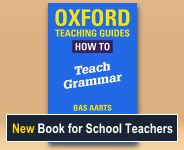Glossary
The Englicious Glossary includes the new National Curriculum glossary terms, which are shown against a white background. However, there's much more to be found here:
- we have added many entries that we feel are important, but cannot be found in the NC Glossary (e.g. connective), and
- in many cases we have added information to the (often very brief) NC entries that need further explanation (e.g. clause and phrase).
Please note that in line with our practice throughout the site, we use capital letters for function terms such as Subject, Direct Object, Indirect Object, Modifier, etc. Although this convention is not followed in the documentation published by the Department for Education we have also done so in the text that forms part of the National Curriculum Glossary.
Tip: Within our units and resources, Glossary items appear highlighted within the text. When you hover over them, or click on them in the Slideshow, a popup is generated.
negated modal verb
negation
neoclassical compound
neologism
neuter gender noun
nominative case
non-countable noun
nonfinite
nonreferential it
noun
Nouns constitute one of the major word classes, which includes words for people, animals, and things (teacher, rabbit, desk) and also many words for abstract concepts (kindness, mystery, technology).
The surest way to identify nouns is by the ways they can be used after determiners such as the: for example, most nouns will fit into the frame “The __ matters/matter.”
Nouns are sometimes called ‘naming words’ because they name people, places and ‘things’; this is often true, but it doesn’t help to distinguish nouns from other word classes. For example, prepositions can name places and verbs can name ‘things’ such as actions.
- Our dog bit the burglar on his behind!
- My big brother did an amazing jump on his skateboard.
- Actions speak louder than words.
Not nouns:
- He’s behind you! [this names a place, but is a preposition, not a noun]
- She can jump so high! [this names an action, but is a verb, not a noun]
Nouns may be classified as common (e.g. boy, day) or proper (e.g. Ivan, Wednesday), and also as countable (e.g. thing, boy) or non-countable (e.g. stuff, money). These classes can be recognised by the determiners they combine with.
- common, countable: a book, books, two chocolates, one day, fewer ideas
- common, non-countable: money, some chocolate, less imagination
- proper, countable: Marilyn, London, Wednesday
Typical nouns share a number of grammatical properties, such as the ability to form a plural (teachers, kindnesses) and to occur after a/an or the (a teacher, the kindness of strangers). Collective nouns indicate collections of individuals (e.g. crowd, family, government) and can take either a singular or plural form of a following verb (e.g. My family are/is on holiday.)
See also noun phrase
noun phrase
A noun phrase is a phrase with a noun as its Head, e.g. some foxes, foxes with bushy tails. Some grammarians recognise one-word phrases, so that foxes are multiplying would contain the noun foxes acting as the head of the noun phrase foxes.
- Adult foxes can jump. [adult modifies foxes, so adult belongs to the noun phrase]
- Almost all healthy adult foxes in this area can jump. [all the other words help to modify foxes, so they all belong to the noun phrase]
See also expanded noun phrase.

